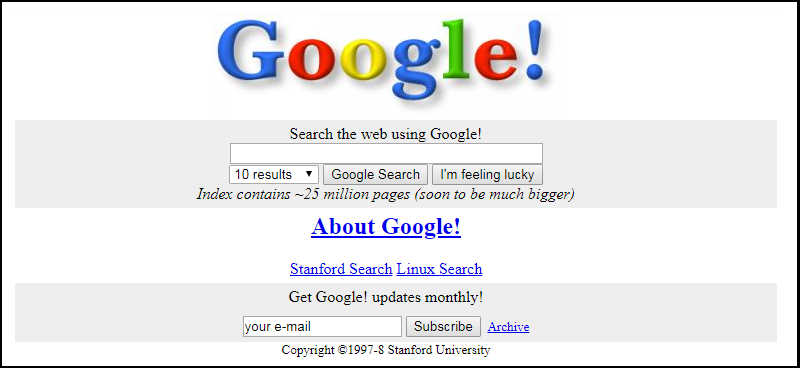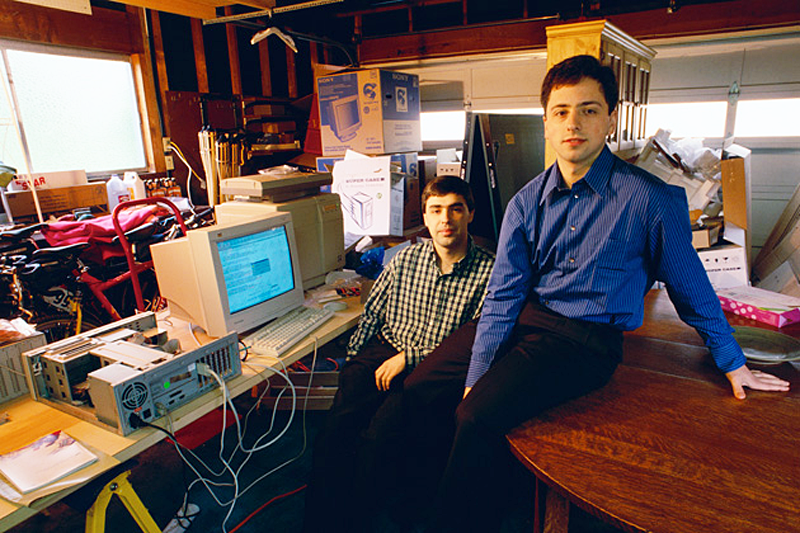NEW YORK, NY – In the early 1990’s, the Internet was in its infancy. At that time, a great majority of information on this new and interesting “World Wide Web” was from colleges and universities. With the growth of this vast amount of information came interest in a better way for finding things which birthed some of the webs very first search engines, many of which you’ve likely never even heard of. Some who used the Internet at that time might be more likely to remember more popular players such as Infoseek, Lycos, Altavista and of course, Yahoo, to name just a few. That’s how people found things back in the mid 90s and these search engines were very primitive; for the most part all they did was rank web pages based on their content and keywords.
However, something else very big was brewing.

In early 1996, two Ph.D. students at Stanford University in California were working on a new type of search engine that would rank web pages differently; Larry Page and Sergey Brin originally called it “BackRub” since in addition to reading content and keywords, it would detect and count ‘back-links’ to determine the importance of a website. The two students concluded that if they could measure the amount of web links pointing to a document on the web, than they could effectively assign a score based on the number of “backlinks” pointing in, and then add that score to any keyword or content relevance initially found, thus ranking web sites based on these overall values. This resulted in a much better and highly quality user experience.
By late 1997 the domain name Google.com was registered and the two students who were running the search engine from a friend’s garage, were ready to rename their innovative search project to “Google” – a word which represented a long string of zero’s and ones. Today that word is a verb in the English dictionary, meaning “to search for information about (someone or something) on the Internet using the search engine Google,” no other search engine has obtained this sort of notability in dictionaries.

While, Google was utilizing its unique “search quality” for its popularity within the search industry, its first major competitor, rising star Yahoo!, which coincidentally was also started at Stanford University, began eyeing acquisitions of other growing search engines to fuel its own growth. Yahoo founders Jerry Yang and David Filo, two Electrical Engineering graduate students who were excelling more in Yahoo’s hugely successful email services, set their sights on other search engines such as Inktomi, Overture, AltaVista and AlltheWeb later acquiring all four of them including numerous other acquisitions.
However, Google continued to utilize its unique link measuring capability and sophistication for improving itself through technology and innovation to not only measure the number of links that were pointing to sites, but to go much further than that – to measure each links’ anchor text, their authoritativeness, their topic related similarities between the linking pages, and a measurement of how trustworthy each individual link was for its target document or web page.
This new game-changing technology was called “PageRank”, named after Google co-founder Larry Page. By 1998 a patent application was submitted to the United States Patent and Trademark Office by Google Technology Inc. The patent titled ‘Method for Node Ranking in a Linked Database‘ described a sophisticated system that could provide “an objective ranking based on the relationship between documents whose content has a large variation in quality and importance.”

This was the beginning of the end for everyone else in search.
By early 1999 Google was looking at lots of interest in their new and unique technology and were beginning to see offers of millions in investment capital with a first initial round of $25,000,000 from venture capital firms Kleiner Perkins and Sequoia Capital who targeted an IPO for the business. Against Larry and Sergey’s personal preferences the business began selling text-based ads on the search engine to generate revenue and launched its Google Ads program in October 2000. The two founders nearly sold the business in quarrels with early investors about compromising search quality over revenue.
By 2018, Google was pulling in revenues of 136.8 billion and was providing jobs to more than 85,000 employees.

About The Author: John Colascione is Chief Executive Officer of SEARCHEN NETWORKS®. He specializes in Website Monetization, is a Google AdWords Certified Professional, authored a how-to book called ”Mastering Your Website‘, and is a key player in several online businesses.

 *** Here Is A List Of Some Of The Best Domain Name Resources Available ***
*** Here Is A List Of Some Of The Best Domain Name Resources Available ***
Leave a Reply